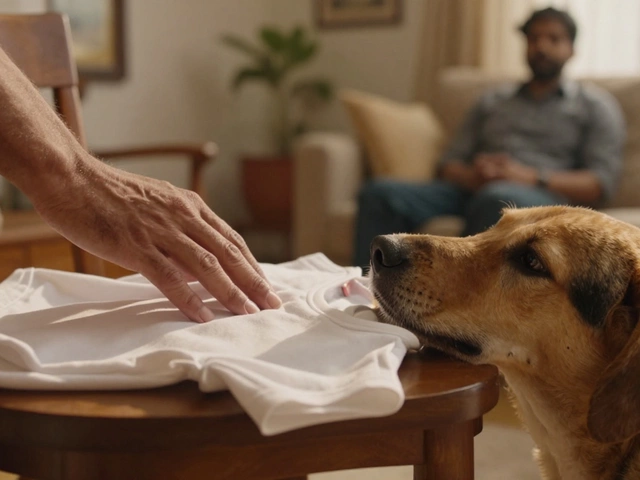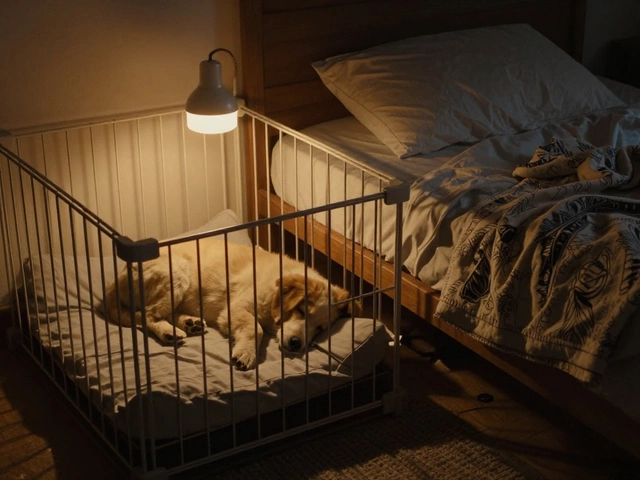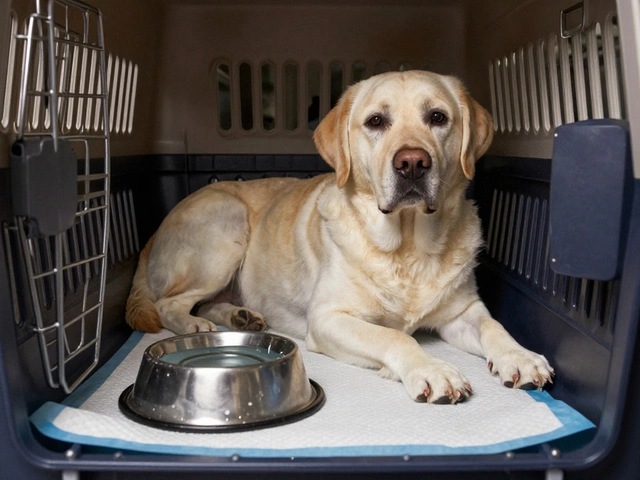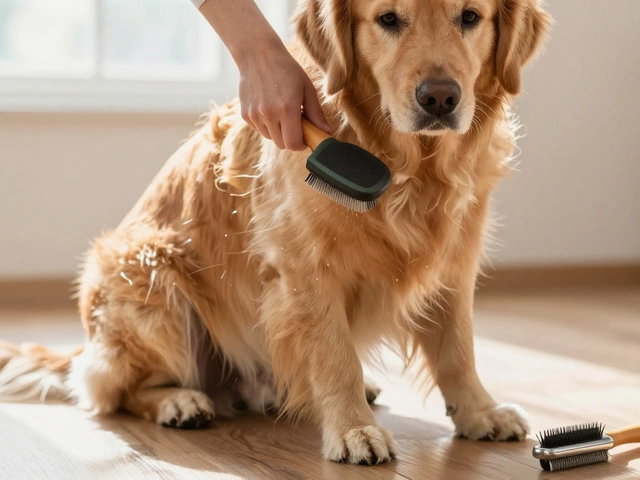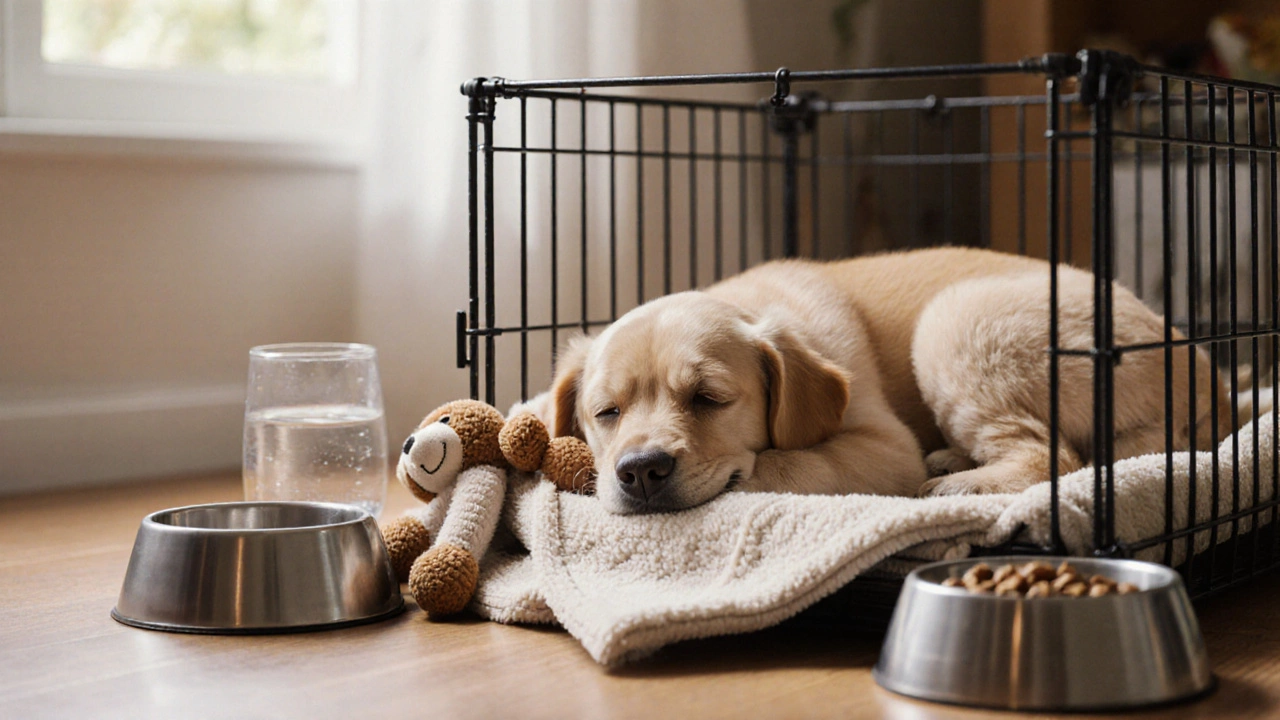
8-Week-Old Puppy Schedule Calculator
Customize Your Puppy's Daily Schedule
This tool generates a personalized schedule based on your daily routine. Enter your wake-up time and typical work hours to see optimal times for meals, potty breaks, and naps.
Personalized Puppy Schedule
Feeding Schedule
Potty Breaks
Getting an 8-week-old puppy home is exciting-but also overwhelming. You’re not just bringing home a cute ball of fur. You’re bringing home a tiny, still-developing creature that needs structure, safety, and consistency to grow into a calm, well-behaved dog. Without a clear routine, your puppy will get anxious, overstimulated, or worse-accidentally learn bad habits like peeing on the rug or chewing your shoes. The good news? A simple, predictable schedule makes all the difference.
Why Structure Matters for an 8-Week-Old Puppy
At eight weeks, your puppy’s brain is still wiring itself. They can’t hold their bladder for more than 2-3 hours. They don’t understand the concept of "no" yet. And they’re wired to explore everything with their mouth. That’s why a schedule isn’t just helpful-it’s essential. A routine gives them security. It teaches them when to eat, when to go outside, when to rest, and when to play. It prevents accidents, reduces stress, and sets the foundation for lifelong good behavior.Studies from the University of Pennsylvania’s School of Veterinary Medicine show that puppies with consistent daily routines have fewer behavioral issues by 6 months of age. That’s not luck. That’s structure.
Sample Daily Schedule for an 8-Week-Old Puppy
Here’s a realistic, doable schedule that works for most 8-week-old puppies. You can adjust times slightly to fit your life, but stick to the same order every day.- 6:30 AM - Wake up, quick potty break outside
- 7:00 AM - Breakfast (high-quality puppy food, measured portion)
- 7:30 AM - Playtime (10-15 minutes with gentle toys)
- 8:00 AM - Nap time (crate or quiet space for 1-2 hours)
- 10:00 AM - Potty break, then short walk or supervised exploration
- 10:30 AM - Nap time (another 1-2 hours)
- 12:30 PM - Lunch (smaller portion than breakfast)
- 1:00 PM - Play or training session (5-10 minutes of sit, stay, come)
- 2:00 PM - Nap time
- 4:00 PM - Potty break, then playtime with chew toys
- 5:00 PM - Short walk or outdoor time
- 6:00 PM - Dinner (largest meal of the day)
- 6:30 PM - Potty break, then calm play or bonding time
- 7:30 PM - Final potty break before bed
- 8:00 PM - Crate time for the night (with a soft toy or blanket)
That’s 16-18 hours of sleep spread across naps and overnight. That’s normal. Puppies need rest to grow. Don’t feel guilty if they’re sleeping. They’re working hard.
Feeding Schedule: What, When, and How Much
At 8 weeks, your puppy should be eating three meals a day. Two meals a day is too much of a gap for their tiny stomachs. Four meals is overkill and hard to manage.Choose a high-quality puppy food labeled for small or medium breeds (depending on your pup’s expected adult size). Look for ingredients like chicken, lamb, or fish as the first ingredient. Avoid fillers like corn, wheat, or soy. Brands like Royal Canin, Hill’s Science Diet, or Purina Pro Plan are vet-recommended and widely available.
Measure portions. Don’t guess. Most puppy food bags have feeding charts based on weight. For a typical 8-week-old puppy weighing 5-8 pounds, that’s about 1/2 to 3/4 cup total per day, split into three meals. Use a measuring cup. Overfeeding leads to loose stools, bloating, and long-term weight problems.
Always keep fresh water available, but remove it about an hour before bedtime to reduce nighttime accidents.
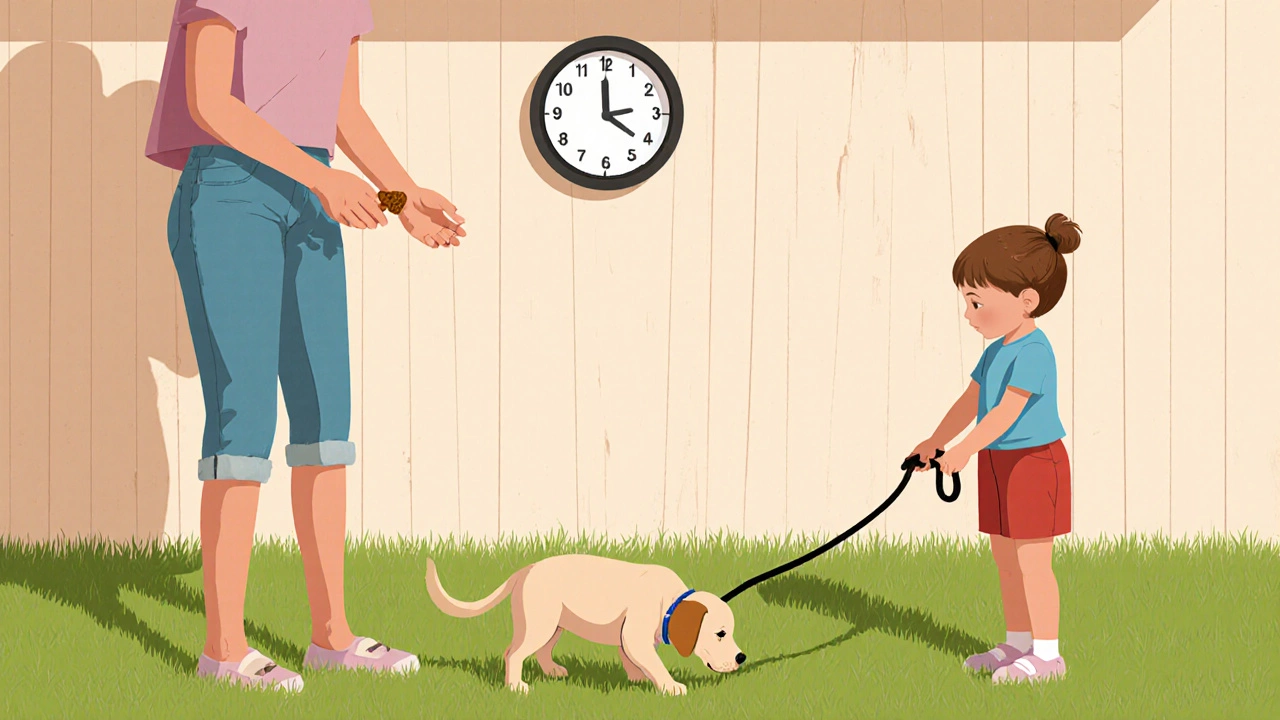
Potty Training: The Most Critical Part
Puppies this age can only hold their bladder for about 2-3 hours. That means you need to take them out every 2 hours-plus after every meal, nap, and play session.Take them to the same spot outside every time. Say a simple cue like "go potty" while they’re doing their business. Praise them immediately with a treat or enthusiastic petting when they finish. Don’t wait for them to start. Catch them in the act, and reward fast.
If they have an accident inside, don’t yell. Just clean it up with an enzymatic cleaner (like Nature’s Miracle). The smell will lure them back if you use regular soap. And never rub their nose in it. That just scares them.
Watch for signs they need to go: sniffing, circling, whining, or suddenly stopping play. When you see it, grab their leash and head out. Consistency builds muscle memory.
Sleep Schedule: Don’t Skip the Naps
Your puppy will nap 18-20 hours a day. That’s not laziness. That’s growth. Their body is building bones, muscles, and neural pathways. If you interrupt naps too often, you’ll create a cranky, overstimulated puppy who’s more likely to chew, bark, or have accidents.Use a crate or a small, puppy-proofed space with a soft bed. Make it cozy, not cold. A stuffed toy or a warm water bottle wrapped in a towel can help them feel secure. Never leave them in a crate for more than 3-4 hours at a time during the day.
At night, expect some whining. It’s normal. Wait 5-10 minutes before checking on them. If they’re not hurt or sick, they’re just testing boundaries. Don’t pick them up or give attention. Let them settle. Over time, they’ll learn the crate is safe and quiet.
Play and Training: Short, Positive, and Fun
At 8 weeks, your puppy’s attention span is about 5-10 minutes. Longer than that, and they’ll burn out or get too wild. Keep training sessions short. Use treats they love-tiny pieces of chicken or freeze-dried liver work great.Focus on three basics:
- Sit - Hold a treat above their nose and move it back slightly. When their bottom lowers, say "sit" and reward.
- Stay - Ask them to sit, then take one step back. If they stay, reward. Gradually increase distance.
- Come - Use a long leash. Call their name + "come" in a happy voice. When they come, reward with a treat and play.
Play with toys that encourage gentle interaction. Avoid tug-of-war with your hands. Use rope toys or soft plushies. Rotate toys every few days to keep them interesting. Too many toys at once? Overstimulation leads to destructive chewing.
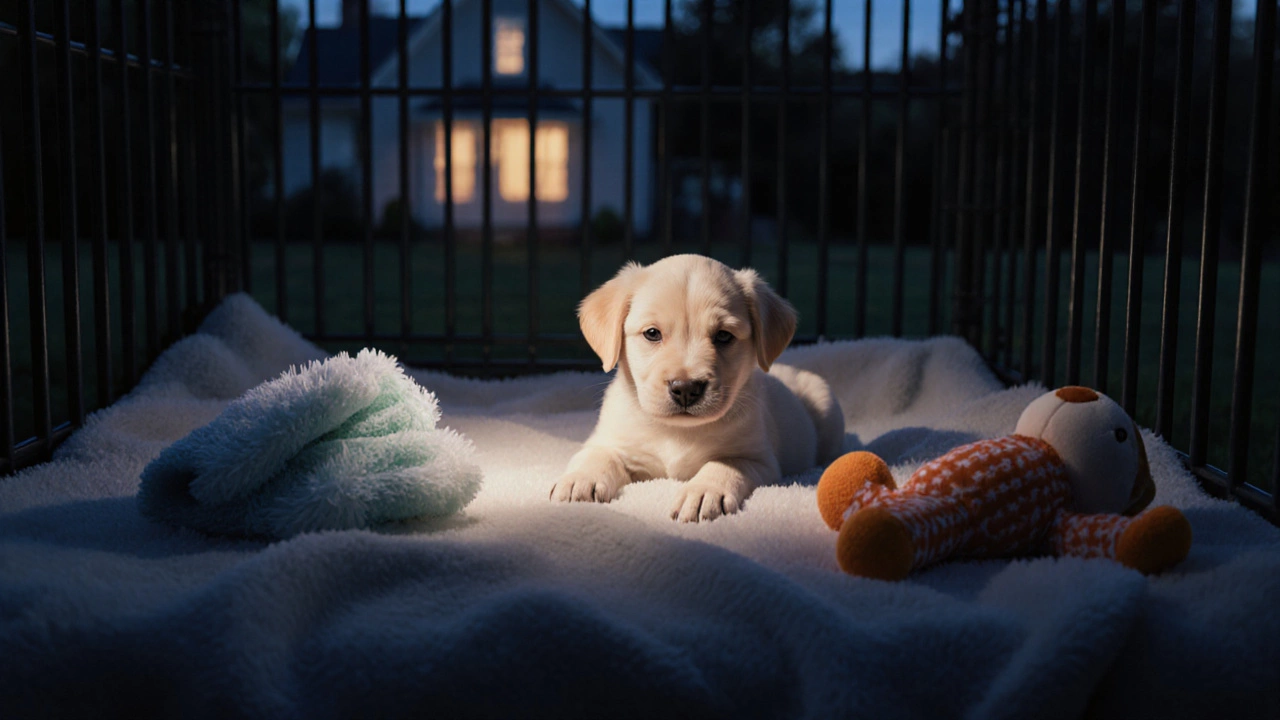
What to Avoid
- Letting them roam unsupervised - Puppies this young will eat socks, electrical cords, or houseplants. Baby-proof like you would for a toddler. - Using punishment - Yelling, alpha rolls, or shock collars damage trust. Positive reinforcement works better and builds confidence. - Skipping vet visits - They need their first round of vaccines at 8 weeks. Schedule a checkup within the first week home. - Ignoring socialization - Introduce them to calm people, friendly dogs, and new surfaces (grass, tile, stairs). Do it gently. Too much too fast = fear.Adjusting the Schedule for Your Life
You don’t have to be perfect. Life happens. If you work 9-5, you’ll need to adjust. That’s okay. The key is consistency, not rigidity.For example:
- If you’re away during the day, hire a dog walker to take your pup out at lunch.
- If you work nights, shift the whole schedule later-just keep the same pattern.
- If you have kids, teach them to be quiet during nap times. Puppies need rest.
What matters most is that your puppy learns to trust the routine. Even if you’re late feeding them by 15 minutes, they’ll still know what comes next. That predictability is their comfort.
What to Expect in the Next Few Weeks
By 10-12 weeks, your puppy will start holding their bladder longer-maybe 3-4 hours. They’ll sleep more through the night. Their chewing will peak as teething kicks in. That’s when chew toys become your best friend.By 16 weeks, most puppies are sleeping 6-8 hours straight. Their energy levels even out. And if you’ve stuck to the schedule, you’ll notice fewer accidents, less barking, and a calmer, happier pup.
This schedule isn’t about control. It’s about giving your puppy the best start possible. You’re not just raising a dog. You’re building a lifelong companion.
How often should I take my 8-week-old puppy out to pee?
Take your puppy out every 1-2 hours during the day, plus after every meal, nap, and play session. At 8 weeks, they can only hold their bladder for about 2-3 hours max. Consistent potty breaks prevent accidents and teach them where to go.
Can I leave my 8-week-old puppy alone for 4 hours?
No. An 8-week-old puppy cannot hold their bladder or stay calm for 4 hours. If you need to be away that long, arrange for someone to check on them at the 2-hour mark. Crating for too long causes stress and accidents. Puppies this young need frequent human interaction and bathroom breaks.
Should I use a crate for my puppy’s sleep schedule?
Yes. A crate gives your puppy a safe, den-like space to rest. It helps with potty training by encouraging them to hold it when inside. Make sure the crate is the right size-big enough to stand, turn, and lie down, but not so big they can use one end as a bathroom. Add a soft blanket or toy for comfort.
What kind of toys are best for an 8-week-old puppy?
Choose soft plush toys, rubber chew toys, or interactive puzzle feeders. Avoid hard plastic or toys with small parts. At this age, they’re teething and exploring with their mouths. A frozen washcloth or puppy-safe chew stick can soothe sore gums. Rotate toys every few days to keep them interested.
Is it normal for my 8-week-old puppy to sleep all day?
Yes. Puppies this age need 18-20 hours of sleep daily. Growth happens during sleep-bones, muscles, and brain development all require rest. If your puppy is eating well, pooping normally, and playing energetically during awake times, they’re perfectly healthy. Don’t wake them up unless they need to go outside.

